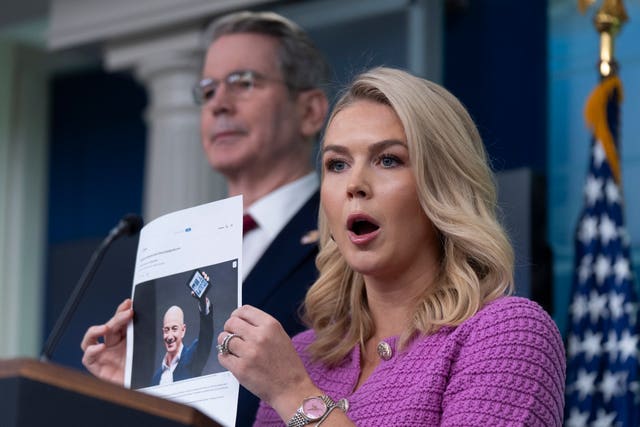Amazon not planning to show added tariff costs next to online product listings
While Amazon later confirmed that it would not be listing such added costs, the Trump administration was quick to criticise news of the move.

Amazon is not planning to list added tariff costs next to product prices on its site — despite speculation spanning from a report that claimed the e-commerce giant would soon show new import charges, as well as fiery comments from US President Donald Trump’s White House denouncing such a move.
The Trump administration’s reaction appeared to be based on a misinterpretation of internal plans being considered by Amazon, rather than a final decision made by the company.
Amazon’s Haul service — a recently launched, low-cost storefront — “considered the idea” of listing import charges on certain products, company spokesperson Tim Doyle said in a statement sent to The Associated Press. But this “was never approved and is not going to happen”.
Amazon launched Haul last year to sell electronics, apparel and other products priced under 20 dollars (£14.92), aimed at competing against the success of China-founded rivals such as Temu and Shein.

Earlier on Tuesday, Punchbowl News had reported that Amazon planned to start showing how much of each product’s cost derived from tariffs “right next to” its total listed price, citing an anonymous source familiar with the matter.
While Amazon later confirmed that it would not be listing such added costs, the Trump administration was quick to criticise news of the move early on Tuesday.
White House press secretary Karoline Leavitt accused Amazon of taking a “hostile and political act” — and further attacked the company by suggesting it was un-American.
“Amazon has partnered with a Chinese propaganda arm,” Ms Leavitt said at a Tuesday briefing with reporters.
It was unclear if the administration had been in contact with Amazon about the company’s response to tariffs — or potential ideas around communicating price hikes with shoppers. At Tuesday’s briefing, Ms Leavitt said she had “just got off the phone with the president about Amazon’s announcement”.
“Jeff Bezos was very nice. He was terrific,” Mr Trump told reporters before leaving the White House for Michigan on Tuesday afternoon.
“He solved a problem very quickly and he did the right thing. He’s a good guy.”
Amazon founder Jeff Bezos was one of a handful of powerful, ultra-wealthy tech titans who attended Mr Trump’s inauguration in January — filling some of the most exclusive seats right behind the president.
Whether his relationship with the president has strained since has yet to be seen, and Ms Leavitt declined to comment when asked by reporters on Tuesday.
The tariffs imposed by Mr Trump — and responding retaliation from targeted countries, notably China — threaten to increase prices for both consumers and businesses.
Economists warned that these import taxes will hike prices for a range of goods consumers buy each day — and lead to worse inflationary pressure.
In recent months, many chief executives and companies have also warned of weaker and uncertain outlooks because of the steep, and at times on-again, off again, import taxes — adding pressures on the Trump administration. And some big names have already raised prices, including Temu and Shein.
Elsewhere, UPS (United Parcel Service) is looking to slash about 20,000 jobs and close more than 70 facilities as it drastically reduces the amount of Amazon shipments it handles.
The package delivery company said on Tuesday that it anticipates making the job cuts this year. It anticipates closing 73 leased and owned buildings by the end of June.
“The actions we are taking to reconfigure our network and reduce cost across our business could not be timelier,” chief executive Carol Tome said in a statement. “The macro environment may be uncertain, but with our actions, we will emerge as an even stronger, more nimble UPS.”
In January UPS announced that it had reached a deal with Amazon, its biggest customer, to lower its volume by more than 50% by the second half of 2026.
During UPS’s fourth-quarter earnings conference call in January, Ms Tome said that the company had partnered with Amazon for almost 30 years and that when its contract came up this year, UPS decided to reassess the relationship.
“Amazon is our largest customer but it’s not our most profitable customer,” Ms Tome said at the time. “Its margin is very dilutive to the US domestic business.”
Ms Tome said that UPS considered various options and determined that the volume reduction was the best alternative.
The company employs about 490,000 workers, according to FactSet.
United Parcel Service Inc. also reported its first-quarter financial results on Tuesday. The Atlanta-based company earned 1.19 billion dollars (£0.89 billion) in the quarter ended March 31.
Stripping out certain items, earnings were 1.49 dollars per share.
Revenue totalled 21.55 billion dollars (£16.07 billion) beating Wall Street’s estimate of 21.06 billion dollars (£15.71 billion).
Shares of UPS rose slightly in morning trading.





